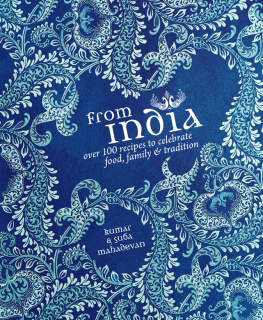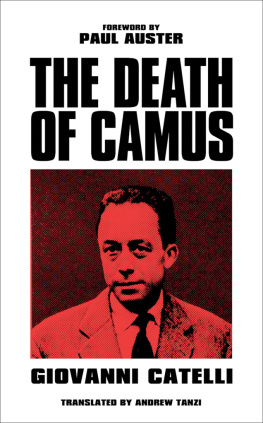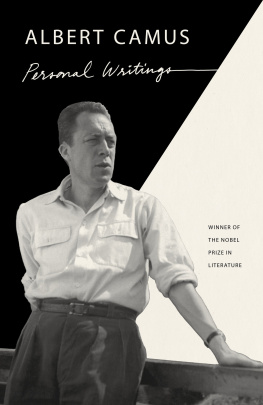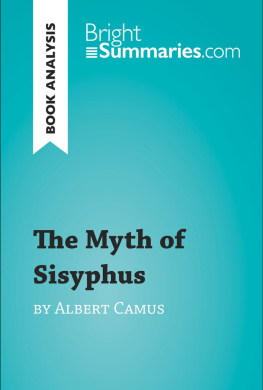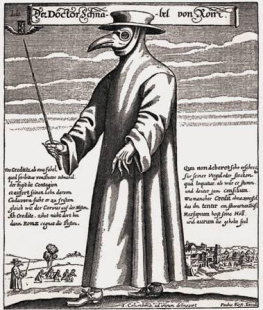Albert Camus
The myth of Albert Camushis personal, political and artistic legacyhas served to confuse and distort the facts of his brief, remarkable life. Herbert Lottman has written the definitive biography of the writer, a full-scale work incorporating testimony from those who knew Camus besthis family and closest friends, his literary peers, his admirers and enemies.
Here is a frank and revealing account of Camus early life in French Algeria, his stifling poverty as a child, his first serious efforts as a writer and thinker, his shattering adolescent confrontation with tuberculosis, a disease that would haunt and plague him all his life.
And here too is the true story of his Resistance work in occupied France during World War II: the growth of his fame as a writer; his friendship and his brutal break with Sartre; the gratifying and deeply disturbing results of winning the Nobel Prize for Literature at such an early age. Through it all runs an appreciation of Camus work in the theaterthe arena he loved best and never ceased to serve.
The result is a portrait not only of Camus, but of the times that made him. For Camussolitary, eccentric, relentlessly moralwas in a very real sense the conscience of a generation. It was, as he often said himself, a lonely roadand one that led him through constant bouts of self-torment and self-doubt. This book is a record of his singular journeyof the extraordinary triumph he achieved without dogma, without compromise, without illusion, a progress through absurdity and revolt, to life.
Internationally recognized as the standard work on Camus life, Lottmans Albert Camus has been translated into many languages.
This edition appears with a new preface by the author and is illustrated with 31 duotone photographs.
Cover design by Julie von der Ropp
Also by Herbert R. Lottman
The Left Bank: Writers, Artists and Politics from the Popular Front to the Cold War
Ptain, Hero or Traitor
The Purge
Flaubert: A Biography
Colette: A Life
The Fall of Paris: June 1940
The French Rothschilds
Jules Verne: A Biography
Albert Camus
Albert Camus
A Biography
Herbert R. Lottman
Gingko Press
Corte Madera, California
1997
Published by Gingko Press Inc.
5768 Paradise Drive, Suite J, Corte Madera, CA 94925
Phone (415) 9249615, Fax (415) 9249608
email
ISBN 978-1-584235-34-7
First published 1979 by Doubleday & Company, Inc.
Copyright 1997 by Herbert R. Lottman
All rights reserved. No part of this book may be reproduced or utilized in any form or by any means, mechanical or electronical, including photocopying and recording, or by any information storage and retrieval system, without permission in writing from the publisher.
Book design by Julie von der Ropp
To all those who helped me
for truths sake
and to those who helped me
for love of their friend Camus.
A premire vue la vie de lhomme est plus intressante que ses oeuvres. Elle fait un tout obstin et tendu. Lunit desprit y rgne. Il y a un souffle unique travers toutes ces annes. Le roman, cest lui. A revoir videmment.
Carnets, II
Pour lacteur comme pour lhomme absurde, une mort prmature est irrparable. Rien ne peut compenser la somme des visages et des sicles quil et, sans cela, parcourus. Mais, de toute faon, il sagit de mourir. Car lacteur est sans doute partout, mais le temps lentrane aussi et fait avec lui son effet.
Le Mythe de Sisyphe
At first glance a man's life is more interesting than his work. It is a stubborn, tightly constructed whole. Unity of spirit reigns. A single breath carries us all along his years. He himself is the novel. A notion subject to revision of course.
Carnets, II
For the actor as for the absurd man, a premature death is irreparable. Nothing can make up for the sum of facts and of centuries that he should otherwise have known. But in any case one dies. For the actor is surely everywhere, but time carries him along also, and does with him what it wishes.
The Myth of Sisyphus
Contents
The reader who comes to this book for the first time is more than likely to be an admirer of Camus and there is no shame in that, for he remains one of our times culture heroes. Still the new reader may find it difficult to believe that as recently as twenty years ago, when this biography was conceived and the interviews and research was under way, Albert Camus was only beginning to emerge from the purgatory that even France reserves for political non-conformists. Many of the people approached for help on the Left Bankthe intellectual heart of Paris and Camus home and workplacewere still uncertain what to think of him, when they were not downright hostile. In the circles through which I maneuvered, Albert Camus had as many enemies (and false friends) as genuine admirers. It seemed extraordinary to me that I was encountering so much doubt about Camus significance, so much apprehensionfor I was stirring old bones, and guilt feelings.
Many Latin Quarter intellectuals had taken the side of Jean-Paul Sartre in the political schism but by then (after the exposure of Stalinism in the Soviet Union and the excesses of Mao Tse-Tungs self-styled cultural revolution) they were beginning to be ashamed of themselves, ashamed but also irritated at the prospect of being questioned about recent history and their relations with the pariah whose biography I was writing. There were still plenty of unreconstructed Sartrians around, and even more fence-sitters (and whose fence-sitting at a time when totalitarianism seemed to be on the move again was tantamount to intellectual treason).
But in those days a biographer could still come up against other equally perilous obstacles. Because of imagined loyalty, some of Camus friends were reluctant to reveal buried truths. And indeed Camus himself had been concerned about the things a biographer might divulge, doing what he could to throw writers off the scent. Those reckless enough to attempt even cursory biographical sketches got no help from him, which may be why the least accurate accounts of Camus life were produced within the walls of the publishing house for which he worked (one hapless writer was only a door down the corridor). Camus private life had to be protected; the reader of this book will learn why his friends thought so.
In the end the present writer succeeded only by convincing old friends and lovers that this might be the only hope for an honest and complete record of their friends life, for otherwise their precious knowledge would disappear with them. I had never done anything as difficult; now I can look with satisfaction at this compilation of eyewitness testimony which can never be duplicated.
There was another serious problem, one I havent written or spoken about until now. Even before he was buried Camus had been taken over by well-meaning family members who sought to protect their own pride as well as a dead warriorand they held essential papers. Because of family concerns, no one had ever tried to publish a serious biography before, not even in France. Here it is tempting to say, especially in France, for in Camus own nation there was little chance of seeing such a book to press. Camus publisher, then still the dominant literary house in Paris, would not displease the heirs by allowing an unauthorized book to see the light of day.
Next page





